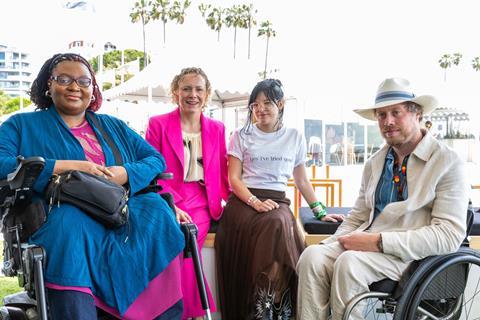
The need for the screen industry to resist pigeon-holing creatives who live with disability was a key talking point during a Cannes UK pavilion event on May 17, titled ‘Creativity and disability: when challenges spark innovation’.
“I’m excited because in one of my new projects, I’m flipping genre that I haven’t seen a lot of disabled representation in – gangster films,” said Abbie Hills, one of the UK’s first trained access coordinators as well as a writer and actor, and founder of talent agency The Dazey Hills Company. “Having a disability or a disabled character doesn’t need to be the defining characteristic. It [can be] like – they wear blue shoes.”
“When I’m writing characters I’m not specifying too heavily what the disability or condition is – I’m leaving room for the performer to fill that in,” said Matilda Feyiṣayọ Ibini, a playwright, author and filmmaker, with credits including Bafta-nominated short form series CripTales. She is currently working on her debut feature, a comedy horror about a disabled woman who finds her perfect carer, who turns out to be a serial killer. “I want as many different types of disabled performer to be able to be cast in my work.”
“The biggest problem when we are talking about narrative structures is often non-disabled people and writers think the disability itself is the struggle,” added Dutch filmmaker Mari Sanders. “But it’s just an extra identity to the character.”
Sanders is in pre-production on his first feature, Get Up Stand Up, centred around two wheelchair users with very different experiences of life, which is set to start shooting in September, with support from the Netherlands Film Fund. His project is the first to receive top-up funding from the Netherlands Film Fund to help make the set more accessible. “I have the honour to make the first feature where that will be included,” explained Sanders.
He said the fund was inspired by the work of the BFI to put this structure in place. “I know there is lots to be done when it comes to accessibility, but the rest of the world is learning from you [the BFI],” he said.
Feyiṣayọ Ibini also spoke about the added expectations put on creatives living with disability to also be the authority on disability and accessibility while on set.
“Often there’s an expectation for disabled filmmakers to take on the labour of educating everyone,” she said. ”I’ll be honest, in my experience that has been exhausting. I’ve turned up, I’m here to work, I’m here to do the job, the last thing I want to do is have to explain the social model of disability to someone or explain why I’m here.
“I’m conscious that yes, so many deaf, disabled and neurodivergent collaborators I work with, we know that’s part of our job, we’re going to have to do some education. But we’re not one, academics and two, teachers. We’re artists and we want to make art.”
When asked by an audience member why disability is often the most forgotten form of representation in the screen industry, Feyiṣayọ Ibini noted: “Capitalism and economic power in the western world in particular, people are determined by how much labour they can produce. If you are not deemed to produce enough labour you are deemed worthless, and thrown away… If you aren’t able to work and be exploited for the 1%, you are not deemed worthy. We see this played out time and time again in UK politics.”















![[L-R]: Amanda Villavieja, Laia Casanovas, Yasmina Praderas](https://d1nslcd7m2225b.cloudfront.net/Pictures/274x183/6/4/1/1471641_pxl_20251224_103354743_618426_crop.jpg)









No comments yet